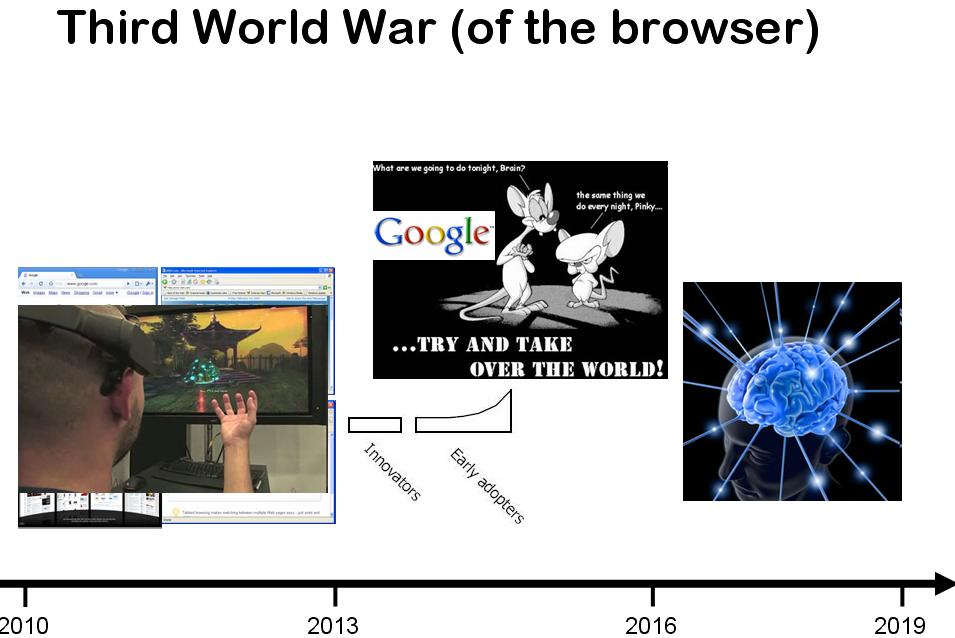Scenario 1, The third World War (of the browser):
Scenario, the third World War (of the browser)
New ways to interact with the browser will launch a new kind of dominant design resulting in a new era of browser wars. With research and development in new technologies different kinds of standards will be formed by developers. Especially in the field of biometrics new developments have emerged that enables us to use our brains as input for the computer. This will cause a richer browser experience that will adapt to only a thought created by the brain. The dominant design from the input devices point of view will change and this will cause software developers of browsers to establish a new design fitting the new input method.
Timeline
2010-2013
Time for a change?
The current economic crisis will just be on the level of entering a stage where world economies are once again able to invest in new research & development. Companies will have to take some risk to attract more and more customers. With this stage setting we look at the browser market in 2010.
The most browsers will work the same way as they do now. Only some evolutionary changes will be added by different developers to keep one step ahead from the competition. While the big players in the browser market stick to the original design of the browser (one window to access the Internet) a small new entrant will appear into the market. This new player will introduce a new concept in which ways a browser can be interacted with using a new input device for the personal computer. This small company will pair its new browser with the new input device (a headwear that can be placed over the head); with this their new browser can be controlled with only thoughts. Also the browser itself will have much more advanced functionalities then conventional browsers. This can be enabled because the input device is not as limited as a keyboard and mouse.
This new concept will only appeal to the early adopters at first, but will gradually manifest itself on a bigger community.
2013-2016
New dominant design
The big browser developers (Microsoft, Apple, Firefox etc.) will take notice of this small entrant. Eventually after being persuaded by what the users want, Google will buy this new company and their concept because they want to increase there market share. Google will enhance the technology by investing much money into the project. This will lead toward a new dominant design for browsing and input devices for the personal computer altogether. By 2016 the W3C will approve this as a standard for the World Wide Web. The bigger developers have to be on the lookout for the emerging economies in these times. The emerging economies will have developed substantially and will have their own vision and strategy to capture the world browser market by their concepts.
2016-2019
Its wartime again
Other developers cannot stay behind with their conventional browsers and will try to imitate the new concept obtained by Google. This will lead into the third browser war. During this period, the conventional input devices will disappear. The new headwear will have become the standard in every home and office environment. In this browser war, the developers will only focus on developing browsers with more affluent user experience and will try to push the new input device to its limits by adding newer functionalities. The constant push to innovate this product by the developers will slowly lead to the point that one browser will eventually have all the thinkable functionalities in this technological cycle. Eventually one developer will come out as the winner.
Conclusion
The Internet will be a place where interaction can be really felt instead of being imitated. Conventional input methods will be replaced by newer ones that enhance our overall experience of the World Wide Web. The focus on interaction with the browser will be central. The individual will interact with a browser and the Internet; because of the uniqueness of a user only one single identity will be needed. This could be acquired through the biometrics input device that is being used.
The strategy regarding Mozilla should be to prepare for this scenario by looking at ways to enrich the browser experience not by the conventional standards at hand, but by newer and innovative technologies.
